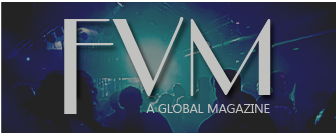INDIA MUSIC GLOBAL DIMENSIONS
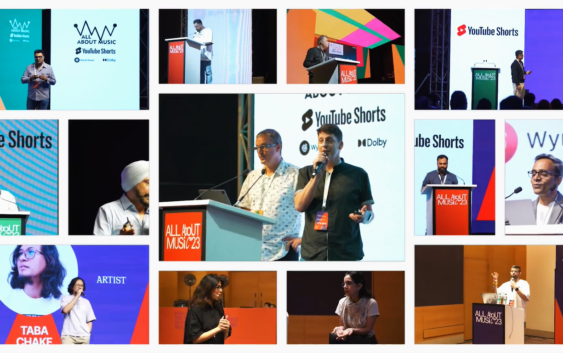
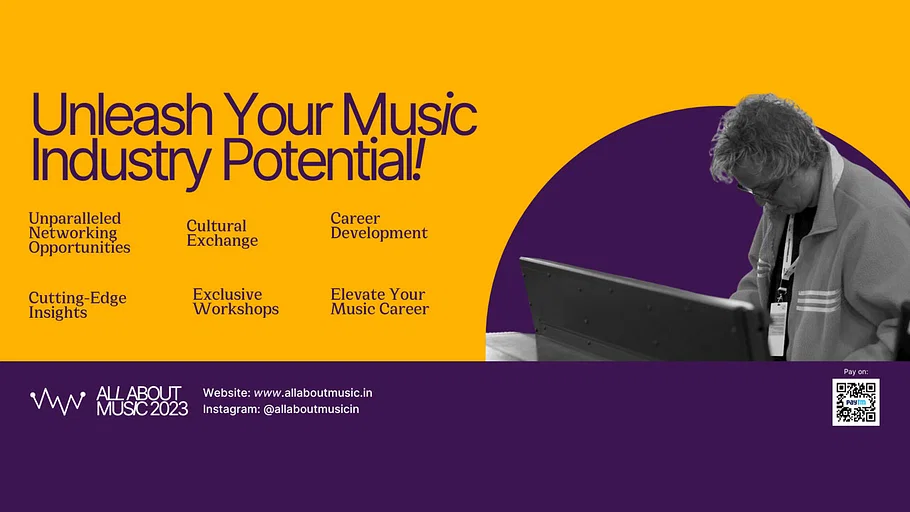
All About Music Conference is a knowledge & business networking platform for the music industry, and is India’s largest music conference, was held from September 7th to 9th, 2023, at the Grand Hyatt Santacruz Mumbai, with the subject “Transitions,” which focused on exploring new frontiers in our business.
All About Music, which debuted in 2017, is a global gateway to the Indian music business. India’s largest B2B music conference has completed six sold-out editions by bringing together industry professionals and stakeholders from all verticals of the music industry and engaging guests in talks about innovations and breakthroughs in the music business.
The theme for 2023 was “Transitions,” with an emphasis on exploring new frontiers in our business. With the rise of new technologies such as artificial intelligence and changing market tendencies in the post-pandemic period, we find ourselves at a crossroads.
How can we navigate this constantly changing landscape? Who can guide us through this transition? And most importantly, which path should we choose? The subject “Transitions” addressed both the personal and global dimensions of this vital time, inviting attendees to make meaningful connections at the conference and rethink the future of the Indian music business.

“At All About Music this year, we attempt to navigate the transitions that are shaping the industry’s future. With ‘Transitions’ as our theme, we embrace the enigmatic forces molding music – from the uncertainty around AI to changing consumption patterns and models within the music industry. Our stage unites local and international voices, bridging genres and cultures” – Ashish Jose, Business Head – Create and Collab.
The event attracted 208+ speakers, 300+ brands, 300+ artists, 40+ international delegates, 3000+ attendees, and hosted over 80 sessions, including Panel Discussions, Keynotes, Workshops, Masterclasses, Showcases, Brand Stories, and much more, allowing attendees to gain valuable insights into the music industry and connect with industry professionals.
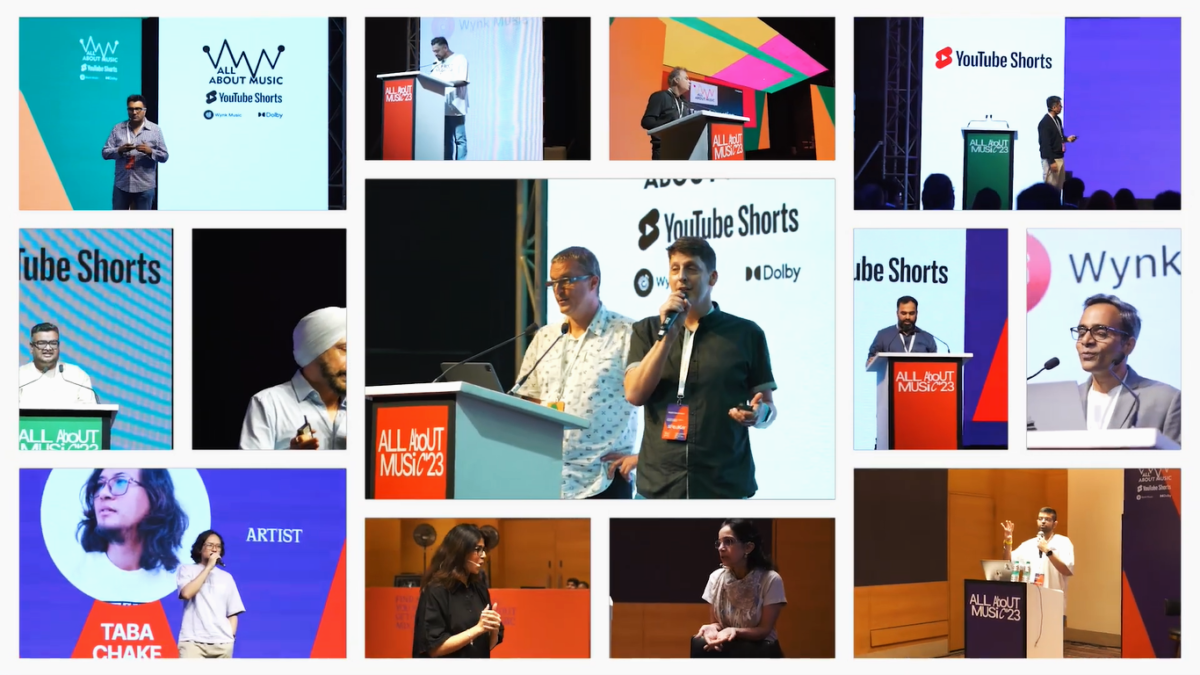
This year’s event offered a three-day immersive experience with hand-picked keynote speakers, engaging panels, interactive workshops, intriguing artist displays, engaging masterclasses, and inspirational discussions. Attendees met industry experts at Connect Corner, networked, and pitched their songs to filmmakers and record labels. The seminar addressed a wide range of subjects, including consumption trends, navigating an artist’s success, music publishing, knowing your rights, current A&R, successful monetization techniques, and music distribution methods.
Some promising personalities who were part of this edition were Shreya Ghoshal, Ricky Kej, Joshua Burke, Alfonso Perez-Soto, Ashwiny Iyer Tiwar, Bismil, Daler Mehndi, Anil Sharma, Jay Mehta, Krsna, MC Stan, Nucleya, Nirmika Singh, Mayur Jumani, Baba Sehgal, Raja Kumari, Satvinder Singh Koli, Srushti Tawade and many more.

“All About Music is a platform curated to put the spotlight on the potential of India’s music industry, and to set new benchmarks and goals. Our aim is to bring the stakeholders together in a wide ‘all about music’ discussion, so we shape the opportunity, shape the future, together,” All About Music – Tarsame Mittal.
Did you know All About Music offers a platform called Pitch Your Music? This is an excellent opportunity for emerging artists to display their talents! There are three options: ‘Pitch to Filmmakers’, ‘Pitch to Record Labels’, and ‘Pitch to Showcase’. You may pitch your song to a jury of directors including Ashwiny Iyer, Mohit Suri, Anil Sharma, Vivek Agnihotri, and Sabbas Joseph. You may also pitch record labels such as Saregama India, Warner Music India, Universal Music Group, T-series, and Tips Music, which will allow you to receive rapid feedback and evaluations. Additionally, the Pitch to Showcase category gives artists the opportunity to perform on the main stage following the conference. The conference’s goal is to empower artists and provide them the opportunity to present their work directly to filmmakers, showrunners, and record companies.
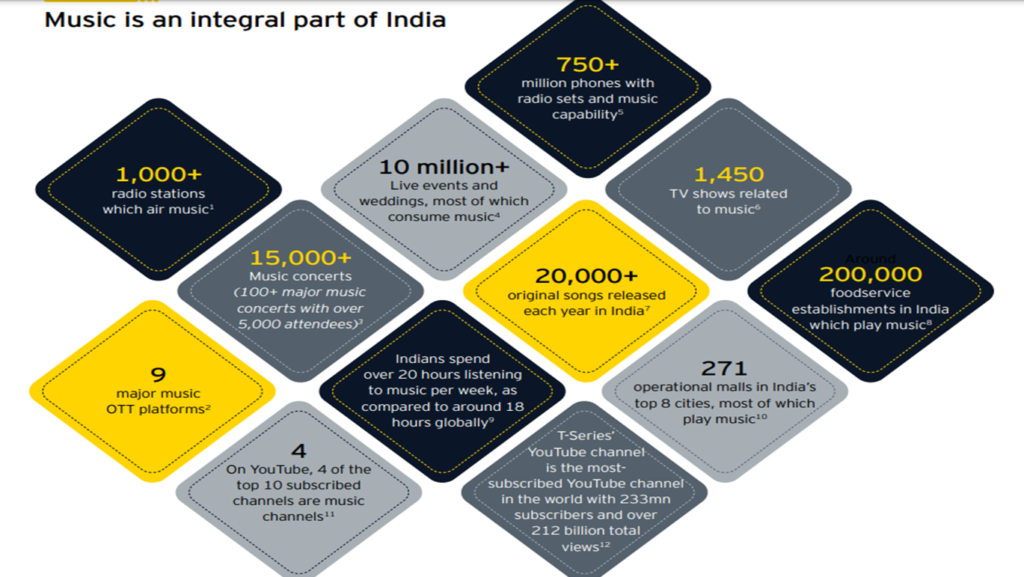
With a population of 1.3 billion music enthusiasts and a rapidly expanding economy, India is poised to become a global powerhouse in the music arena. The country’s diverse and eclectic musical heritage, combined with the meteoric rise of digital streaming platforms and the influence of Western music, has created a fertile ground for new and innovative musical genres and styles to flourish.
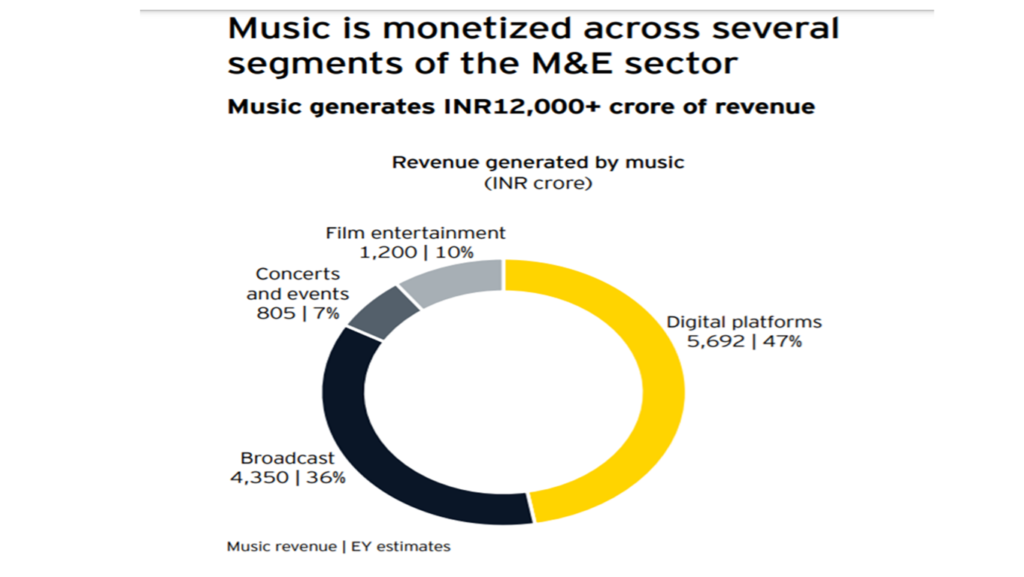
India’s music industry is also witnessing a revival of regional and local language music. With the rapid growth of digital streaming platforms, artists are embracing their linguistic heritage, creating a diverse tapestry of musical expression. Tamil, Punjabi, and other regional languages are experiencing a renewed interest, as audiences gravitate toward music that resonates with their cultural roots and local communities. The proliferation of local language music is not only expanding the country’s musical landscape but also fostering a sense of cultural pride and unity among India’s diverse population.
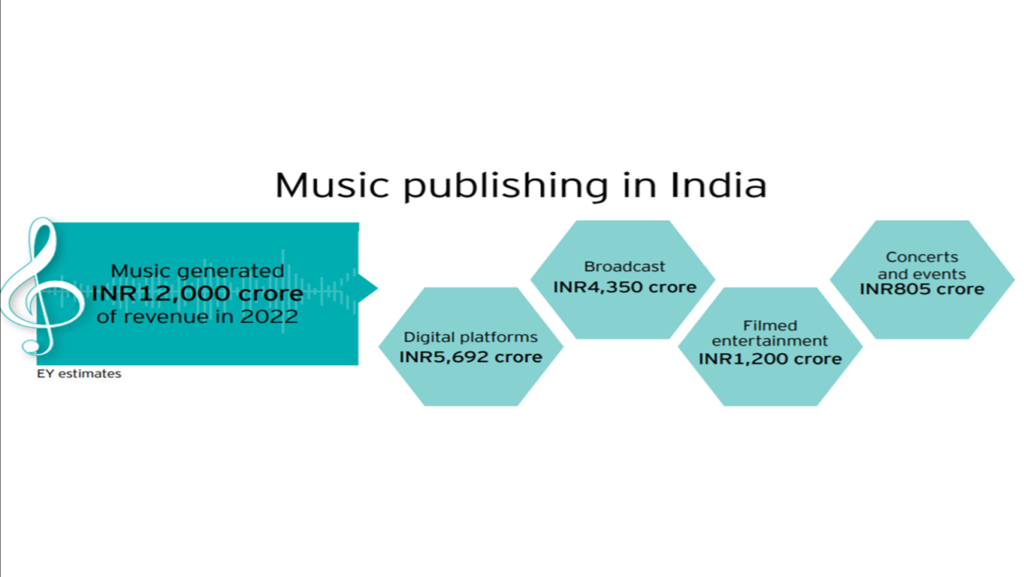
E and Y believes that music is essential to streaming, movies, television, radio, gaming, and social networking. It generates around INR12,000 crore in revenue in India, accounting for approximately 6% of the Media and Entertainment industry. Indian music are among the most popular in the world, ranking seventh on the Top Ten YouTube Global Charts for 2022. Of the INR12,000 crore (US$1.5 billion) generated by music, recorded music revenues of labels have crossed INR2,500 crore (US$312 million) in 2022, while music publishing revenues will approximate INR884 crore (US$100 million) in 2022-23. However, India’s global revenue ranking is far behind other developed markets.
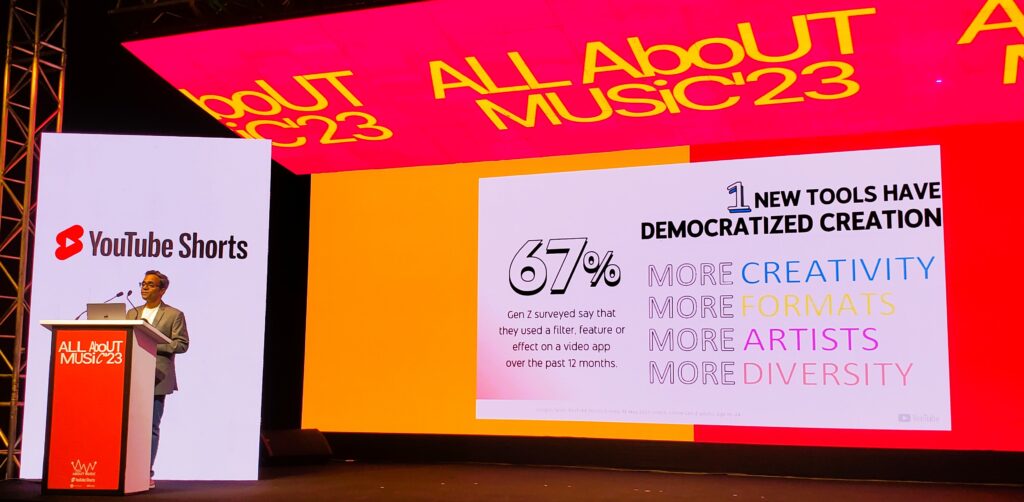
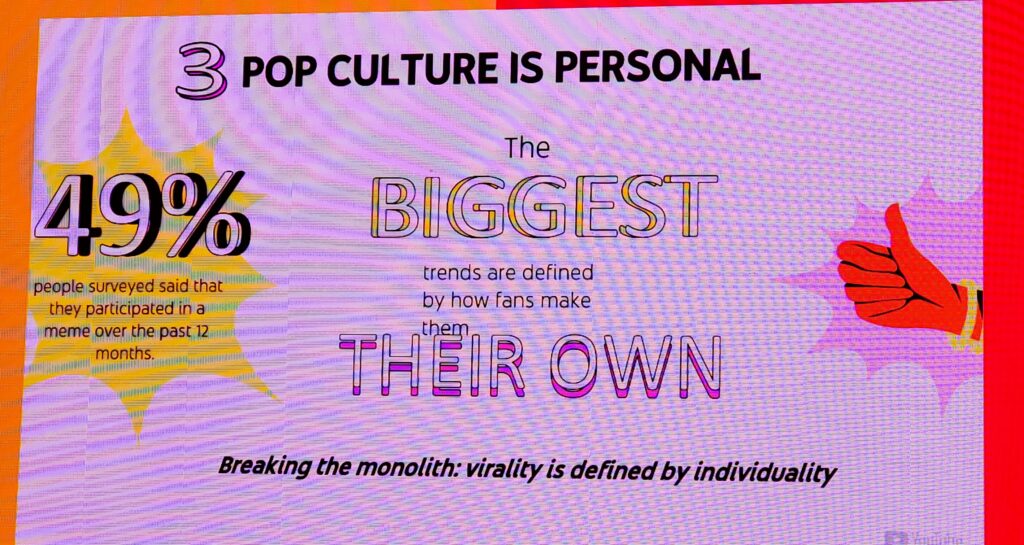
The keynote by 15 years of YouTube in India – How the Ingenuity of Indian Creators, Artists and Fans is Shaping a New Wave in Digital Video by Pawan Agarwal, Pawan highlighted, YouTube Music continues to provide musicians with opportunities to advance their careers by concentrating on music revenue, marketing, and creative expression. And what sets YouTube apart for music enthusiasts is that it is the only platform where they can discover, consume, and participate in music across all music formats – all in one location. Fans are discovering, connecting with, and consuming music and videos in a variety of ways on YouTube and YouTube Music, and with the right set of tools, which we are constantly developing, we are encouraging fun and engaging fan participation, allowing them to become true fans of the artist, ready to create content that promotes the artists they love.
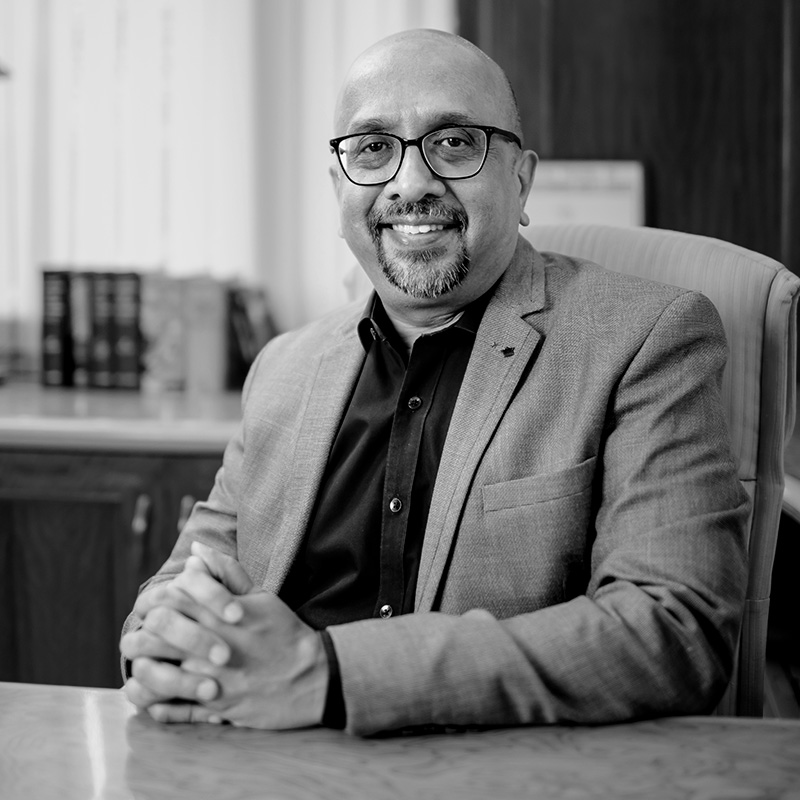
In the panel discussion, Creating The Future – Navigating Transitions in Music Publishing. Rakesh Nigam, Indi Chawla, Indrajit Sharma, Anurag Rao. Moderated by Atul Churamani, a question asked by delegate on receiving royalties under India’s Copyright Act, where she read out ‘We confirm that you need not pay any kind of royalties.We further confirm that we are neither members of PPL or IPRS.’ Indian radio stations have required musicians to sign a dubious No Objection Certificate. This has naturally made musicians reluctant to join copyright collecting groups, even though they are legally entitled to income under India’s Copyright Act.
However, in response to another query, Nigam stated that it was impossible to predict when stations would pay. “Don’t worry,” replied Nigam. “Sign whatever you want because the law says that no radio station can write in your contract that you are waiving away your right to royalty because they are barred by law. When the distribution happens, you will get your rightful share.”
“Lawyers have a beautiful way of saying, ‘You’re interpreting this as the glass is half full, I’m saying it’s half empty, let’s test it out in court’,” he said. “They can drag this for years. [The law] is clear. The interpretation is not.”
Rakesh’s unwavering efforts to preserve creators’ and music publishers’ royalties have definitely boosted IPRS from a Rs 47 crore organisation to a staggering Rs 565 crore powerhouse, altering the landscape of musical copyrights and performance rights in India.
Rakesh Nigam launched the “My Music My Rights” Campaign, with the primary goal of creating awareness among music composers nationally about their intellectual property rights (IPR). With copyright laws guaranteeing an inherent right to royalties, the campaign aims to bridge the knowledge gap between artists and rights holders by emphasising the necessity of competent intellectual property management.
Mr. Nigam emphasised the lack of understanding among artists, which exposes them to exploitation and financial disasters. The “My Music, My Rights” initiative takes a holistic approach, including workshops, seminars, and online sessions to provide creators with understanding about rights management, licencing, and royalties, assuring fair recompense for their efforts.
By raising awareness and participating in advocacy initiatives, creators may become champions for fair practices in the music business, ensuring a sustainable environment for all stakeholders.
A Call to Action: In a powerful message to music producers and fans, Mr. Nigam emphasised the necessity of understanding and safeguarding music industry rights. Educating oneself on copyright and royalties not only protects individual interests, but also helps to ensure the overall health and viability of the music industry.
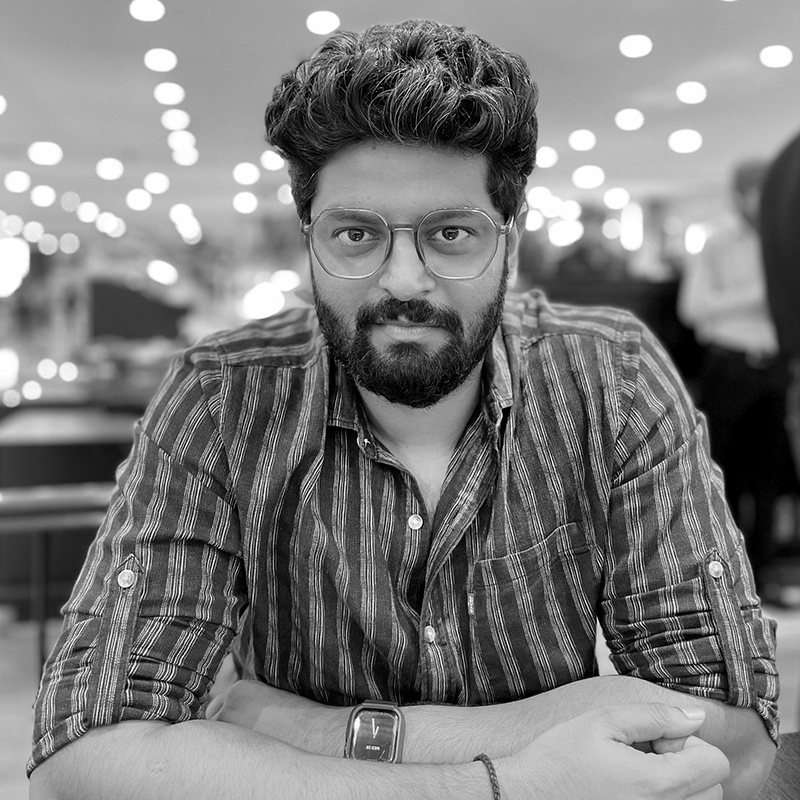
The panel discussion on, “What Does Success Mean to Artists Today?” with Aayushman Sinha, Rahul Sinha, Edwin Charles Albert, Indira Rangarajan. Moderated by Amit Gurbaxani.
Edwin Charles Albert (above), the head of content and partnerships at telco Airtel, the parent company of Indian DSP Wynk Music, stated that on streaming platforms, “the ability of artists to hold or retain users” is a more accurate assessment of success than the amount of plays.
He said, “We calculate an ‘active’ rate [or their] capability to evoke their tribe. Say [they have] 100 followers, and every time they reach out to their audience or have a release, if the active rate is more than 70% or [at least] 70 out of the 100 people are listening to the song, that’s a good rate. There are artists who don’t even cross 20% or 10% but have millions of followers. For [rapper MC] Stan, [for example], it’s around 80%.”
The traditional yardstick for measuring success in the music industry has long been based on the number of streams and downloads. However, with the advent of music streaming platforms, the paradigm is shifting towards a more holistic understanding of success.
The ability of artists to engage and retain users on streaming platforms is now seen as a crucial marker of success. This encompasses not just the initial play count but also the depth of engagement with the artist’s entire catalog, including repeat listens, playlist adds, and fan interactions.
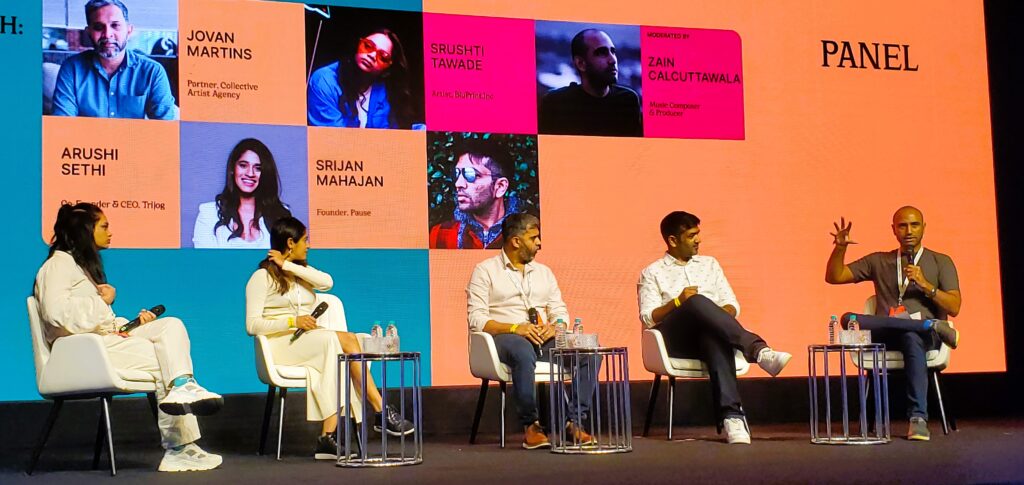
The panel discussion on Music & Mental Health – Finding Harmony in Music with panelists Srushti Tawade, Arushi Sethi, Jovan Martins, Srijan Mahajan and moderated by Zain Calcuttawala.
Girish B views –
The power of music lies in its ability to resonate with the human experience on an emotional level. When an artist bares their soul through song, sharing their personal journey with honesty and vulnerability, they create a connection with their audience that transcends the music itself.
The voice of the story, whether it be one of pain, joy, heartbreak, or triumph, speaks to the universal struggles and triumphs that we all experience. It becomes a shared language, uniting listeners with a sense of empathy and understanding.
The delicate balance between therapy and lifestyle choices is crucial when it comes to maintaining mental health. While music can be a powerful tool in managing mental health issues, it should not be viewed as a replacement for professional therapy or medication.
Just as a healthy lifestyle includes a balance of physical activity, healthy eating, and regular sleep, mental health also requires a multi-faceted approach. Music can be a valuable component of a holistic treatment plan, providing emotional support and fostering mindfulness, but it should not replace professional help when needed.
In the context of mental health, music provides a unique form of emotional expression that can help individuals process and cope with their feelings.
The importance of music in mental health cannot be overstated. Its cathartic power allows people to release pent-up emotions, providing a sense of comfort and connection. Listening to or creating music can serve as a form of self-care, promoting relaxation, reducing stress, and even improving cognitive function. In addition, music can be a powerful tool for social connection.
The symbiotic relationship between music artists and the business side of the industry plays a crucial role in promoting mental health and well-being. When artists feel supported and respected by the industry, they are better able to focus on their craft, leading to more authentic and powerful music.
Respect for an artist’s choices and freedom of expression allows them to create art that is true to their vision, providing a sense of fulfillment and purpose. This, in turn, benefits the business as well, resulting in a more creative and profitable industry.
On the flip side, the artist must also respect the needs and limitations of the business.
Music is a powerful force that can profoundly influence mental health and well-being. From soothing nerves to reducing stress and anxiety, the therapeutic benefits of music have long been recognized.
According to research, listening to music can:
Increase Serotonin: Music releases serotonin, which is the body’s natural “feel-good” chemical, helping to elevate mood and improve overall well-being.
Stimulate Dopamine: Music can stimulate dopamine production, the “reward” chemical in the brain, increasing feelings of pleasure and motivation.
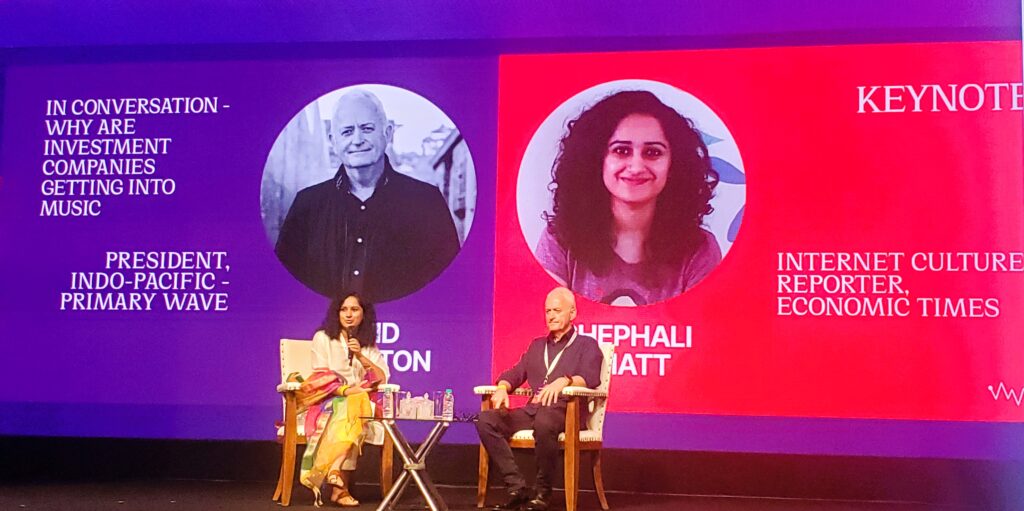
The Keynote: In Conversation – Why are Investment Companies Getting into Music with David Loiterton by Shephali Bhatt
David Loiterton who has worked for artists and songwriters for 30 years, his views on investment companies entering the music industry highlight the potential for financial gain and market growth, as well as potential concerns about the impact on the artistic and cultural aspects of the industry.
From an investment perspective, music presents a lucrative opportunity, given the steady revenue streams from music streaming and the enduring popularity of music as a cultural staple. Investment companies can benefit from diversifying their portfolios and capitalizing on the industry’s upward trajectory.
However, there is a risk that an increased focus on profit and market share could negatively impact the artistic and creative aspects of the industry.
Global investment is another step in his development into foreign markets, as he continues to capture growth for his artists, composers, and management clients. This new relationship will allow Primary Wave, its roster of artists, and catalogue of music to be brought to a major new worldwide market across all channels, from streaming to live performances and beyond.
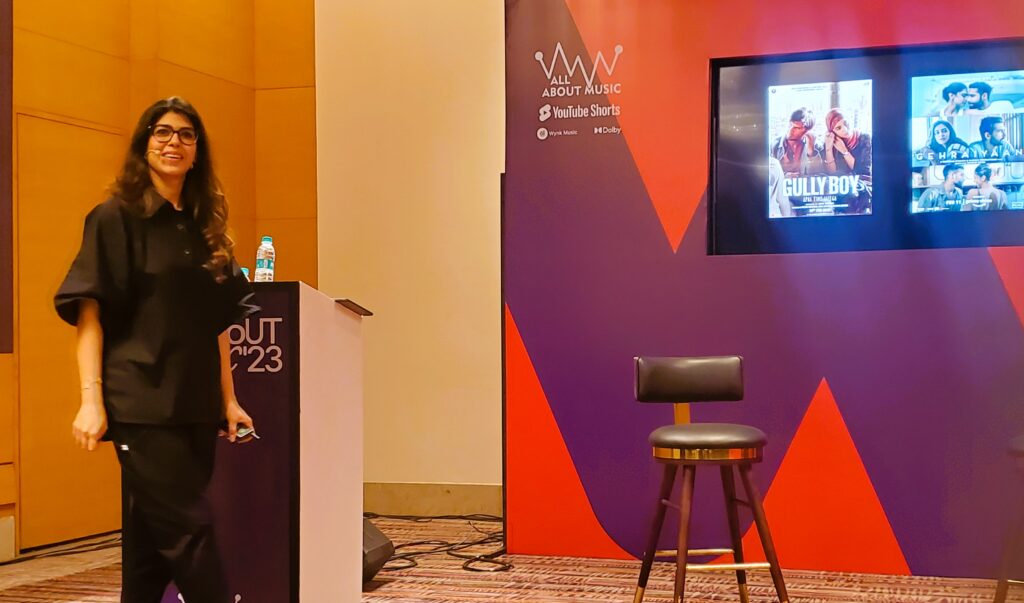
Workshop on Copyright, Publishing & Contracts by Priyanka Khimani, a leading entertainment lawyer, she delved into the intricate and essential aspects of copyright, publishing, and contracts within the music industry. Her insights highlighted the need for artists to understand their rights and legal options in order to protect their work and maximize their earnings. Copyright protection kicks in the moment the work is created.
Khimani emphasized the importance of copyright, explaining that it protects original creative works and gives artists the exclusive right to control and monetize their work. She recommended registering copyright to ensure legal protection and documentation.
She explained that publishing refers to the rights associated with a composition, including the rights to record, perform, and distribute the work. She advocated for artists to understand the intricacies of publishing deals, and to ensure they receive fair compensation for their work.
Khimani stressed the importance of reading and understanding contracts, advising artists to seek legal advice if they don’t fully understand the terms. She also warned of pitfalls like signing away publishing rights for too long, or accepting unfavorable royalty splits.
Khimani suggested artists pay particular attention to standard clauses in contracts, such as termination rights, buy-out clauses, and sync rights, as these can have significant long-term implications for their careers.
She advises artists to seek advice from experienced lawyers and music industry professionals when negotiating contracts, to ensure they receive fair terms and don’t unknowingly give away valuable rights.
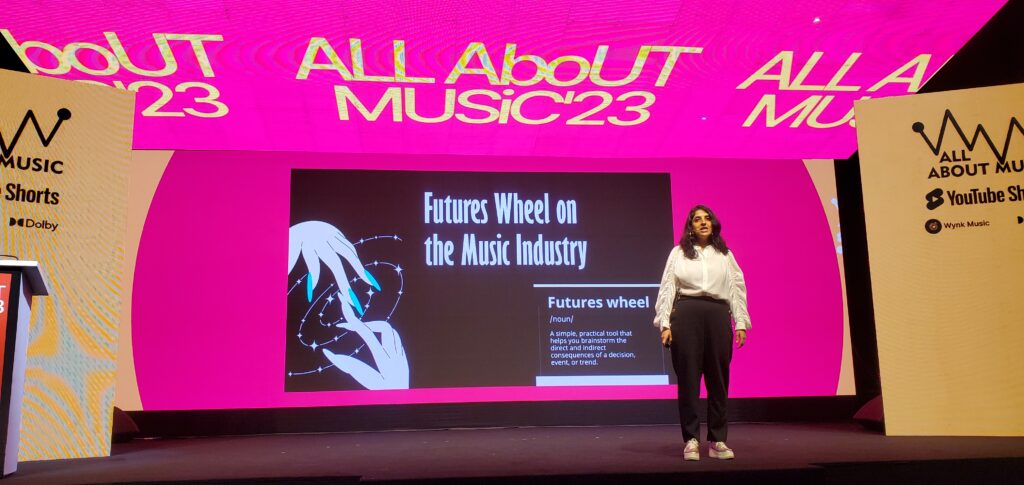
The keynote by Sowmya Iyer on AI and Web 3.0 and its Role in the Music Industry, she envisioned that AI being used to personalize and enhance music discovery, recommending songs and artists based on individual listening habits and preferences. She suggested that AI could even be utilized in the creation of music, composing unique melodies or creating new sounds that blend different genres and styles.
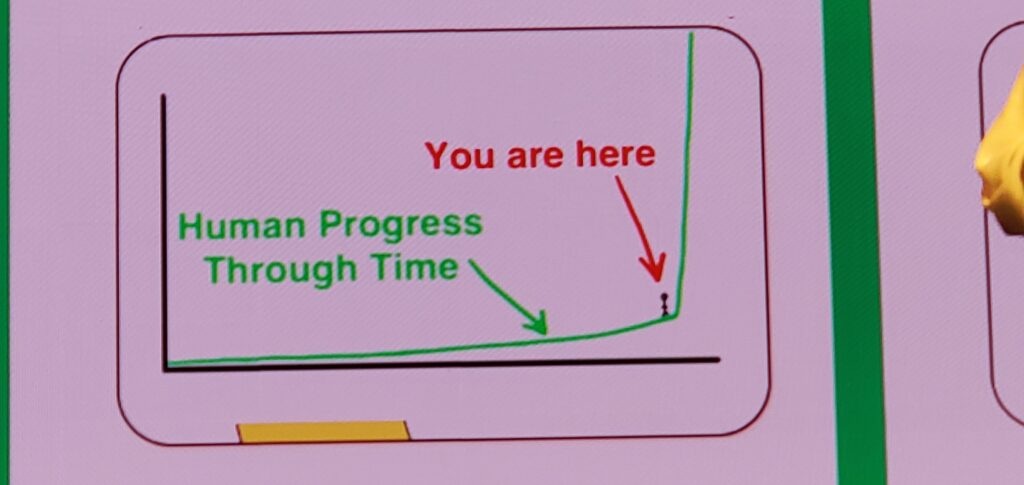
She believes that the decentralized nature of Web 3.0 will allow artists to regain control over their work, cutting out intermediaries and directly monetizing their content via blockchain technology. Iyer cautioned that these innovations also bring challenges, such as ensuring fair compensation for artists and navigating potential legal issues around AI-generated content.
Her overall view is that while these technologies may disrupt the current music industry, they present exciting opportunities for artists to explore new avenues for creativity and monetization.
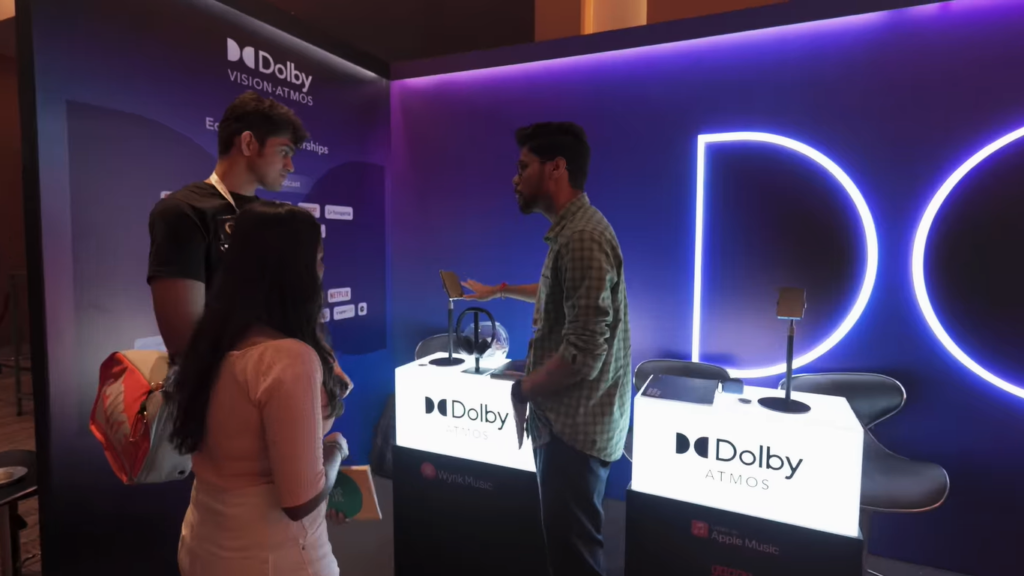
Dolby Atmos Music is an immersive music experience that enhances space, clarity, and depth in your music. Instead of merely hearing your music, Dolby immerses you in it. Dolby Atmos®, our extraordinary audio technology, provides immersive sound that travels all around you with astounding realism.
Dolby Atmos broadens the creative possibilities for artists and innovators. Instruments and voices may be separated and articulated with great clarity. And the usage of multidimensional space gives listeners the impression that they’ve walked inside the music.
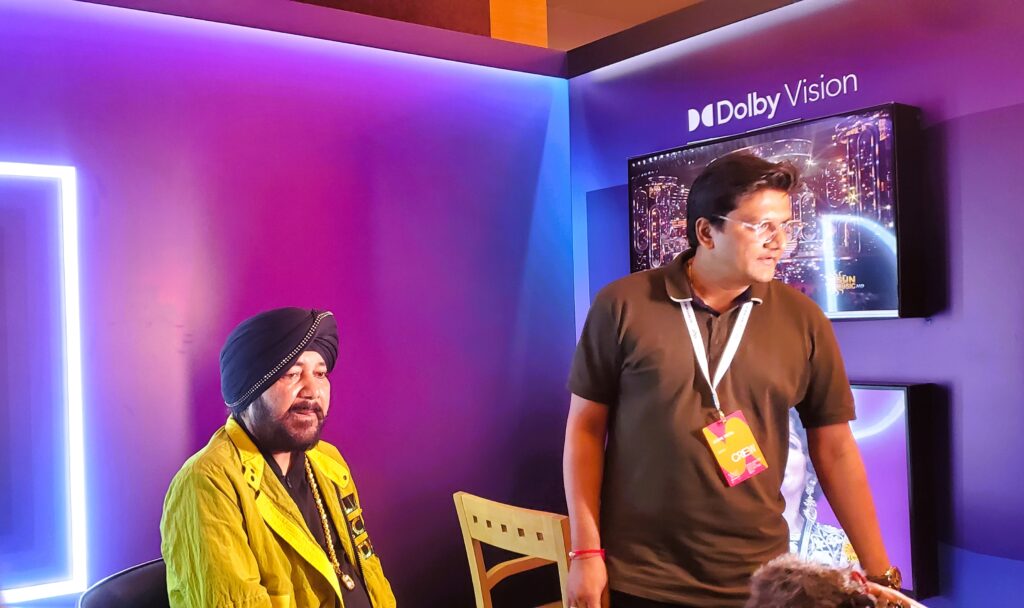
Dolby Vision allows content creators and users to produce and distribute videos with high-quality colour, contrast, and detail – drawing viewers in with dynamic image quality that enhances the entertainment experience. Furthermore, Dolby Vision is said to improve the visual experience on the platform, regardless of whether the video is a cinematic landscape or a family adventure.
Dolby currently has a presence in India across all aspects of life, including cinema, television, computers, mobile devices, video games, and automobiles, catering to a wide range of interests, including film, television, music, podcasting, sports, and vernacular content.

Back for its 8th edition this year, the All About Music (AAM) 2024, happening on 6th, 7th and 8th of August 2024 in Mumbai, India is your one-stop solution for forging powerful connections and igniting strategic collaborations. Launched in 2017, AAM thrives on collective growth for the music industry by globally uniting artists, experts, and all industry players.

